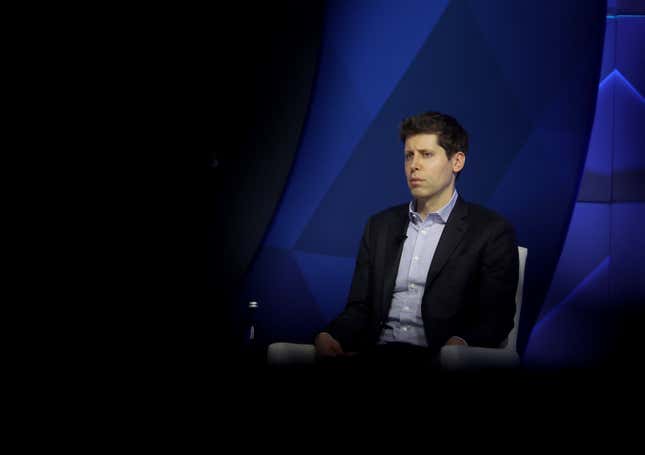
In This Story
OpenAI is now worth more than people were expecting.
Wednesday, the artificial intelligence startup announced it had completed a $6.6 billion funding round, valuing it at $157 billion. The ChatGPT-maker’s raise is the largest private investment ever and puts OpenAI among the top three largest startups with venture backing, Bloomberg reported.
Before the deal was finalized, OpenAI was expected to raise $6.5 billion in a round that would value it at $150 billion.
“OpenAI needs follow-on funding to expand model training efforts and build proprietary products,” Brendan Burke, senior emerging technology analyst at PitchBook (MORN-0.74%), said in a statement shared with Quartz. With the funding, OpenAI can keep up with its new competitor, xAI, which recently raised $6 billion, in building custom data centers, Burke said. He added that both multibillion-dollar raises show “the quantum of funding needed to remain competitive for frontier training efforts with the latest hardware.”
However, Richard Windsor, founder of research firm Radio Free Mobile, said in a note after OpenAI’s raise that the startup “has capitalized on investors’ desperation to invest” in AI and set “very unusual terms that are yet another indication that AI remains in the midst of its 4th and largest bubble.”
In OpenAI’s funding announcement, the company said ChatGPT has over 250 million users globally every week. The company said in September that it had reached one million paid business users, and an unnamed person told CNBC (CMCSA+0.03%) the company has 11 million subscribers to ChatGPT Plus. In August, the startup’s monthly revenue reached $300 million — up 1,700% from the start of 2023, the New York Times (NYT+0.23%) reported. OpenAI expects to end the year with $3.7 billion in annual sales, according to financial documents that reporters at the New York Times reviewed.
The report also found that OpenAI expects $11.6 billion in revenue next year. According to PitchBook, the startup is “progressing toward $5 billion in annual recurring revenue,” mostly due to ChatGPT. Burke said OpenAI’s “revenue growth supports further valuation growth, which encourages employees to remain at the company and progresses toward the trillion-dollar valuation that CEO Sam Altman believes the company can grow into.”
But OpenAI’s revenue expectations will require its number of subscribers to grow by four times what it currently is, according to Windsor.
“This is supposed to be achieved with no price erosion despite an increasingly bewildering number of competitors and Mark Zuckerberg’s contention that everyone is already ‘slashing prices’ to compete with Llama 3 priced at $0 per month,” Windsor said.
In a note prior to the raise, Windsor said OpenAI “is no longer miles ahead of the competition,” and that with Meta’s (META-2.36%) release of its flagship open-source Llama models, “the stage is set for rapid price erosion.” Another sign of a bubble, he said, is that free generative AI services are adding more features.
“This is the pin that bursts the [AI] bubble in my opinion and given how much it has been inflated, there will be a significant correction to reality,” Windsor said.
The startup also anticipates losing around $5 billion this year due to expenses such as running its AI models and paying employees, according to the New York Times’ review. But according to Windsor’s calculations, “ChatGPT+ should be hugely profitable by itself leading me to wonder where the rest of the money is going.”
According to Windsor, the valuations of companies adjacent to generative AI, such as alternative energy startups and chipmakers such as Qualcomm (QCOM+0.20%) and Nvidia (NVDA-1.54%) — where Windsor said he sees most of the $6.6 billion raise likely going — “are far more reasonable and both will still perform well even if generative AI fails to live up to expectations.”
Meanwhile, valuations of OpenAI and its competitors, who the startup has reportedly asked its investors not to back, “will only be able to defy gravity for so long” before a correction happens, Windsor said. According to Crunchbase, global venture funding for startups slowed in the third quarter of this year, but startups in the AI sector were at the top for investments.
OpenAI’s new funding comes amid a spate of executive resignations and other governance issues, Windsor said, which means the startup will likely “fall the furthest and the hardest when the bubble eventually does burst.”
OpenAI did not immediately respond to a request for comment.
While the release of the company’s “reasoning” model, o1, and internal testing on frontier models “justifies continued investment in model development,” PitchBook also noted OpenAI’s executive departures, saying the company will likely evolve “with different executive leadership than that of the ChatGPT era.”
According to PitchBook estimates, the generative AI software market is on track to double next year, exceeding $30 billion.